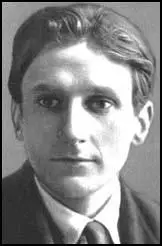Edmund Blunden

Edmund Blunden was born in London in 1896 but soon afterwards the family moved to Yalding in Kent. Educated at Christ's Hospital and Queen's College, Oxford, he joined the Royal Sussex Regiment on the outbreak of the First World War.
During the war Blunden fought at Ypres and the Somme and won the Military Cross for bravery. Blunden wrote about these experiences in Undertones of War (1928). Blunden also producing collected editions of the work of the war poets, Wilfred Owen (1931) and Ivor Gurney (1954).
Blunden held several academic posts including professor of English literature at Tokyo University, University of Hong Kong and Oxford University. Blunden wrote books on Leigh Hunt, Thomas Hardy, Percy Bysshe Shelley and Charles Lamb. He also published several volumes of poetry: Pastorals (1916), The Waggoner (1920), The Shepherd (1922), English Poems (1925), Poems: 1930-40 (1941) and After the Bombing (1950). Edmund Blunden died in 1974.
Primary Sources
(1) Edmund Blunden, Vlamertinghe: Passing the Chateau (July 1917)
And all her silken flanks with garlands drest -
But we are coming to the sacrifice.
Must those flowers who are not yet gone West?
May those flowers who live with death and lice?
This must be the flowerist place
That earth allows; the queenly face
Of the proud mansion borrows grace for grace
Spite of those brute guns lowing at the skies.
Bold great daisies' golden lights,
Bubbling roses' pinks and whites -
Such a gay carpet! poppies by the million;
Such damask! such vermilion!
But if you ask me, mate, the choice of colour
Is scarcely right; this red should have been duller.
(2) Edmund Blunden, Preparations for Victory (1918)
My soul, dread not the pestilence that hags
The valley; flinch not you, my body young.
At these great shouting smokes and snarling jags
Of fiery iron; as yet may not be flung
The dice that claims you. Manly move among
These ruins, and what you must do, do well;
Look, here are gardens, there mossed boughs are hung
With apples who bright cheeks none might excel,
And there's a house as yet unshattered by a shell.
"I'll do my best," the soul makes sad reply,
"And I will mark the yet unmurdered tree,
The tokens of dear homes that court the eye,
And yet I see them not as I would see.
Hovering between, a ghostly enemy.
Sickens the light, and poisoned, withered, wan,
The least defiled turns desperate to me."
The body, poor unpitied Caliban,
Parches and sweats and grunts to win the name of Man.
Days or eternities like swelling waves
Surge on, and still we drudge in this dark maze;
The bombs and coils and cans by strings of slaves
Are borne to serve the coming day of days;
Pale sleep in slimy cellars scarce allays
With its brief blank the burden. Look, we lose;
The sky is gone, the lightless, drenching haze
Of rainstorms chills the bone; earth, air are foes,
The black fiend leaps brick-red as life's last picture goes.
